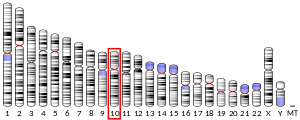GPR120
G-protein coupled receptor 120 is a protein that in humans is encoded by the GPR120 gene.[5][6]
GPR120 is a member of the rhodopsin family of G protein-coupled receptors (GPRs).[5][6]
GPR120 has also been shown to mediate the anti-inflammatory and insulin-sensitizing effects of omega 3 fatty acids.[7] Lack of GPR120 is responsible for reduced fat metabolism, thereby leading to obesity.[8]
Additionally, GPR120 has been implicated to be involved in the ability to taste fats.[9] It is expressed in taste bud cells (specifically cell type II, which contain other G-protein coupled taste receptors), and its absence leads to reduced preference to two types of fatty acid (linoleic acid and oleic acid), as well as decreased neuronal response to oral fatty acids.[10]
References
- 1 2 3 GRCh38: Ensembl release 89: ENSG00000186188 - Ensembl, May 2017
- 1 2 3 GRCm38: Ensembl release 89: ENSMUSG00000054200 - Ensembl, May 2017
- ↑ "Human PubMed Reference:".
- ↑ "Mouse PubMed Reference:".
- 1 2 Fredriksson R, Höglund PJ, Gloriam DE, Lagerström MC, Schiöth HB (Nov 2003). "Seven evolutionarily conserved human rhodopsin G protein-coupled receptors lacking close relatives". FEBS Lett. 554 (3): 381–8. doi:10.1016/S0014-5793(03)01196-7. PMID 14623098.
- 1 2 "Entrez Gene: GPR120 G protein-coupled receptor 120".
- ↑ Oh DY, Talukdar S, Bae EJ, Imamura T, Morinaga H, Fan W, Li P, Lu WJ, Watkins SM, Olefsky JM (2010). "GPR120 is an omega-3 fatty acid receptor mediating potent anti-inflammatory and insulin-sensitizing effects". Cell. 142 (5): 687–698. doi:10.1016/j.cell.2010.07.041. PMC 2956412. PMID 20813258.
- ↑ Ichimura A, Hirasawa A, Poulain-Godefroy O, Bonnefond A, Hara T, Yengo L, et al. (2012). "Dysfunction of lipid sensor GPR120 leads to obesity in both mouse and human". Nature. 483 (7389): 350–4. doi:10.1038/nature10798. PMID 22343897.
- ↑ PMID 24631296
- ↑ PMID 20573884
Further reading
- Vassilatis DK, Hohmann JG, Zeng H, Li F, Ranchalis JE, Mortrud MT, Brown A, Rodriguez SS, Weller JR, Wright AC, Bergmann JE, Gaitanaris GA (2003). "The G protein-coupled receptor repertoires of human and mouse". Proc. Natl. Acad. Sci. U.S.A. 100 (8): 4903–8. doi:10.1073/pnas.0230374100. PMC 153653. PMID 12679517.
- Hirasawa A, Tsumaya K, Awaji T, Katsuma S, Adachi T, Yamada M, Sugimoto Y, Miyazaki S, Tsujimoto G (2005). "Free fatty acids regulate gut incretin glucagon-like peptide-1 secretion through GPR120". Nat. Med. 11 (1): 90–4. doi:10.1038/nm1168. PMID 15619630.
- Oh JH, Yang JO, Hahn Y, Kim MR, Byun SS, Jeon YJ, Kim JM, Song KS, Noh SM, Kim S, Yoo HS, Kim YS, Kim NS (2006). "Transcriptome analysis of human gastric cancer". Mamm. Genome. 16 (12): 942–54. doi:10.1007/s00335-005-0075-2. PMID 16341674.



